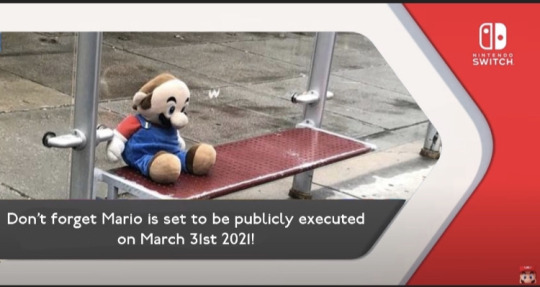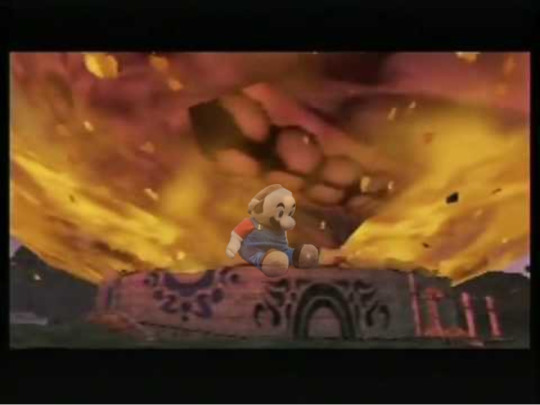#depressobean rambles
Text
dsmp ppl on tiktok and twitter are like “oh my god i hope i get my cc notice that would be so fun” meanwhile everyone on dsmpblr is pointing guns at each other like “any one of you could be a cc and if you are i won’t hesitate to shoot”
#like i’d be flattered if you stopped by my page but also i wouldn’t and that would terrify me#duality of me#depressobean rambles#mcyt#dsmp#putting this in the tags cuz it’s like a grade b shitpost#tubbo#ranboo
3K notes
·
View notes
Text
yttd and themes of parental failure; how the adults in our life disappoint us
alternate title: how everyone in your turn to die has mommy issues, daddy issues, or both
I’m not the first person to talk about this, nor will I be the last, but there are a lot of themes sprinkled throughout YTTD’s story and one of the themes that isn’t talked about much is the theme of how parents (or more broadly, adults) tend to fail us. Throughout the game, we see children and adults being placed in the same deadly situation, and are disappointed time and time again as the adults prioritize their lives over those of their children... often perpetuating the cycles of abuse that they themselves have suffered. I don’t think this theme encompasses the whole story by any means, but I do think that, in some parts, YTTD attempts to tell a story of irresponsible adult figures, failing as parents, and the ways cycles of abuse are perpetuated.
I think it’s best to start with Sara, the main character and the most visible victim of the adults’ failings in the death game. Despite being a teenager, she’s elevated to a position of leadership partially by circumstance and partially by the machinations of others. I think it’s pretty clear that her being a leader is more crucial to the story than it initially seems to be, but for now it’s evident that she, as a child, has been deemed stronger than the many adults beside her in the game and has thus been made a leader. It’s acknowledged that she is the person who makes the majority of the crucial decisions, she is the person the others look to in times of turmoil, and she’s tasked with shouldering many of the heavy burdens of the group’s failures. This certainly doesn’t come without consequences; much of Sara’s grief comes not just from Joe’s death, but from regret over the countless people she’s failed to protect and the obligation she feels to prioritize their lives over her own. While many of the adult characters (Q-taro, Keiji, Shin, Alice) have the opportunity to sit back and make more selfish decisions for their own survival, Sara never has that liberty because she’s been thrust into a role where the group’s wellbeing is worth more than hers and every group failure is felt by her more than anyone else. This is most evident in the aftermath of the Kanna/Shin decision, specifically in the Kanna Dies route; Sara is the one who is tortured and meant to feel the most pain for Kanna’s death because she, as the leader, felt obligated to take the decision into her own hands... and nobody stopped her. From Russian Roulette (where Kai, the least underhanded out of all of Sara’s adult protectors, tried to stop her from becoming a leader) to Chapter 2′s Main Game, the effects of Sara’s leadership are heavy. She’s still a child who’s been given power, and the other adults in the game choose to either profit from or resent this power instead of challenging the fact that a child has been entrusted with it.
This is where Kanna comes in, another child who’s been failed by the adults in the game. When she entered, she’d lost her most important mentor figure (her sister) and as a result was left incredibly vulnerable. At first, a few of the characters tried to help her (Nao and Reko), but ultimately she was left vulnerable for too long and Shin used that vulnerability to coerce her into going along with his plans, putting her life in jeopardy by claiming she had the Sage. It’s likely that Shin reminded her of Kugie, which motivated her to stick by his side, but there’s no doubt that his manipulation influenced her to continue supporting him throughout chapter 2. Kanna is another character who felt obligated to provide protection and support for adults who didn’t provide all that much of it, which is made evident as she continues to insist he’s a good person throughout ch2 and, of course, demands that everyone vote for her to die in the main game because she thinks Shin is not only good but much more useful than she is. She, like Sara, continues to prioritize the well-being of the group over her own as a result of the position she was forced into and of the failure of the adults around her to do anything about it.
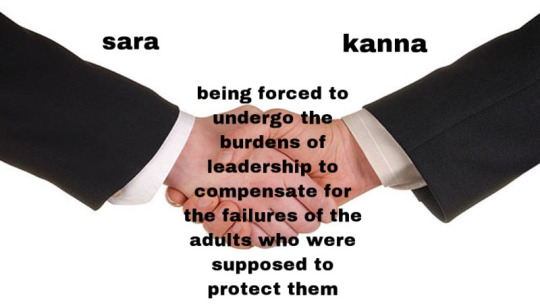
This aspect of Kanna’s character ties into another point I want to make, about cycles of abuse and protection. I believe that Shin is one of the biggest in-game examples of how abuse victims can be pushed to perpetuate those cycles upon the people they’re supposed to love and care for. Shin definitely cared for Kanna; he wrote the message in the phone to boost her spirits and fought for her to survive even knowing that if she got the Sacrifice she wouldn’t pick him to escape with. However, a lot of his dynamic with her comes as a result of the abuse he suffered under Sou Hiyori, and this abuse is part of why Kanna perceives herself to be worthless. He takes out his own anger at himself and his weakness by constantly belittling Kanna, calling her weak and useless to the group (eventually doing this because he thinks it will help her escape), and the constant reinforcement of this mindset is what leads to her self loathing and, in some cases, eventual self sacrifice. Not only does Shin fail to protect Kanna from death as a parental figure, he fails to prevent his own patterns of abuse from affecting her. This is a classic example of how abuse can become generational.
I want to cycle back to the topic of Sara, now, and bring Keiji into the mix, because I believe that Keiji is one of the biggest and also most fascinating examples of the failures of adults- primarily because he is simultaneously the child being failed and the adult who is failing. Keiji started out as an idealistic child with high hopes for his own future and strong beliefs in the police force, but he ended up killing his mentor and destroying his own faith in the goodness of the police. I also find it intriguing that the person he kills is one of the most solid parental figures in the game; Mr. Policeman cares for his child a lot and shows great care for children who aren’t even biologically related to him (such as Keiji). He likely left the police force for the sake of his child as well as to escape corruption. When Keiji kills him, he is not only killing the idealistic dream that his child self once harbored, but he is killing the biggest human embodiment of that dream in his life. Fittingly, then, Keiji goes on to turn into the opposite of what his younger self would have wanted to be. He wanted to be a protector, but in the Death Game we see him flirting with the child he’s protecting, consistently lying to and deceiving her for his own gain, pushing her into being a leader because it benefits him, and going behind her back to help himself survive (such as performing the card trade with Q-taro when it’s clear that Sara had the Sacrifice and likely would have died because of it). At the surface, Keiji is a betrayal of the mentor Sara needed in her life, but when you look beyond that, he’s a betrayal of the adult figure who guided him and the adult figure his child self wanted to be.
There’s also Q-taro, one of the more blatant examples of an adult who valued his own survival over those of the children in the game. His selfishness, however, wasn’t concealed with concern for the children, like Shin’s and Keiji’s were. He indirectly participated in thrusting Sara into a leadership position, and time and time again attempted to get the children (specifically Gin) killed because he thought it would benefit either him or the group. His selfishness is not as much of a betrayal as it is a sad reinforcement of the idea that adults in this game can’t be trusted to protect the children. Even as he campaigns for Gin and Kanna’s deaths, even as he waits until the last minute to press the button, he still looks to Sara for guidance and trusts her as a leader. To make things even worse, the child whom he’s targeting has already been disillusioned to how pathetic adults can be; Gin’s father abuses alcohol, and as Gin establishes from the beginning, he’s already lost his trust in the reliability of adults. And, in a sad way, Gin ends up being proven right; his first father figure in the game dies immediately, and his second either dies or is quickly revealed to have been tasked with killing him. Unreliable adults in awful circumstances.
Then you have Gashu, one of the only actual parents in this game, whose failures are felt in not one, but two children. As I stated before, while talking about Sara, Kai was one of the only people who made a move to stop Sara from being established as the group’s leader in Russian Roulette. While I believe that this is mostly because he knew of the Hades Incident and wanted to stop it from being replicated, I also have to wonder if it was because he knew what it was like, as a child, to be forced into a terrible position (as Gashu had high expectations of him as an assassin) and didn’t want the child he’d grown affectionate towards to be forced to undergo the same thing. Whatever his motives were, Kai was an example of the pain neglectful parents can bring, and he provides a stark contrast to Ranger, who wasn’t yet aware of Gashu’s cruelty when we met him. We watched in real time as Ranger realized that he wasn’t actually all that loved or valued; he was just created to serve a purpose, and when he stepped out of line he quickly lost his value. Just like how Kai served the purpose of being an assassin, and, potentially, how Sara serves the purpose of being the leader. Gashu isn’t just a neglectful parent, he’s outright malicious.
I’d like to speculate, then, about how the story is going to take the path of neglectful adults as it goes forward. I already think that we can see where it’s going to go with Sara, as 3-1a has clearly showcased the effects of her guilt and, depending on which route you take, has either established that she’s grown comfortable with her position as leader or is crumbling under the pressure of her grief. However, going back to the theme of parents... it must be noted that almost none of the characters have been confirmed to have 2 biological parents. They either come from an orphanage or are missing a parent... and the parent they’re missing is typically the father. I have to wonder if this consistent theme of failed parenting is going to tie into Gashu’s reminder to “question your upbringing,” and if the shitty adults are going to make a more literal appearance.
#holy FUCK this was long#if you read this entire thing idk whether to thank you or apologize#also this was so poorly written im so sorry lol#yttd meta#your turn to die#yttd#kimi ga shine#sara chidouin#shin tsukimi#kanna kizuchi#keiji shinogi#depressobean rambles#my writing
330 notes
·
View notes
Text
ranboo face reveal idea: he reveals what both his parents’ faces look like and our challenge is to figure out how their dna configured to create his face
159 notes
·
View notes
Text
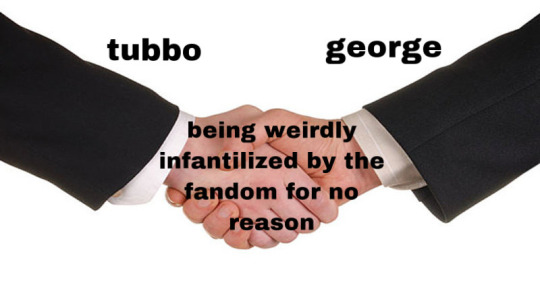
#honestly at this point idk if some of you even watch their streams#depressobean rambles#dsmp#tubbo#georgenotfound
217 notes
·
View notes
Text
not to danganronpa post on main but i’m still so mad that kodaka had so many wasted opportunities to write a much more interesting story and simply didn’t. he killed off his interesting and motivated protagonist for the sake of male character development, which was a pretty boring move. then he also had the idea in chapter 3 of “if two murders occur, only the person who committed the first murder will be executed” which is a fascinating concept that he then scrapped because both murders were committed by the same person. like... imagine if someone else had committed the chapter 1 murder, and kaede had lived and continued to be the protagonist. as opposed to her fear and paranoia about the mastermind culminating in chapter 1, it increases steadily. with the weight of 4 of her classmates’ deaths on her shoulders, she becomes increasingly more paranoid and desperate to seek out the mastermind. in chapter 3 someone dies and kaede, believing solidly that the person who killed them is the mastermind, murders who she thinks is the culprit. in the trial she learns that her guess, both about who committed the murder and who the mastermind is, was incorrect. because she committed the second murder, she lives on, but the newfound discovery that she’s a murderer makes for palpable distrust among the group members and heavily disrupts her position as leader. if this was how the story went, it would allow kaede to remain a protagonist while still letting the fears and flaws that got her killed in chapter 1 have their role in the story. in fact, her eventually snapping after 4 people have already died would make a lot more sense than her snapping with nobody dead yet. and her biggest goal was for everyone to trust her and for her to remain a reliable leader- the most impactful thing that could happen to her would be for her reputation as a leader to be damaged by her own actions. this is literally just using elements kodaka brought up in game (and obviously it doesn’t account for everything because deaths would have to be switched around) but it would make for much better writing.
#i think i’ve posted this before#and i’m sure i’m not the first one to come up with this idea but#man#depressobean rambles#danganronpa#drv3 killing harmony#kaede akamatsu#drv3 spoilers
201 notes
·
View notes
Text
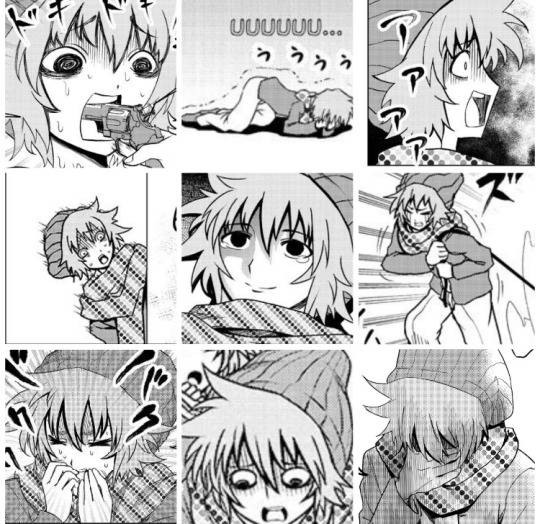
nankidai using the 4komas to make a fool out of shin moodboard
351 notes
·
View notes
Text
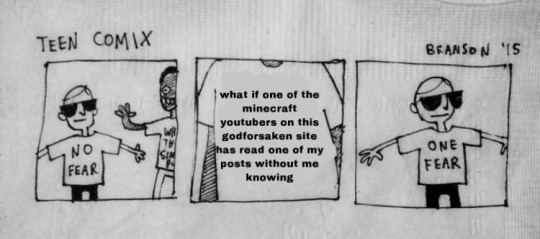
#i haven’t even said anything weird but the idea is still terrifying#putting this in the tags cuz i’m hilarious and everyone loves me#depressobean rambles#dsmp#dream smp#mcyt#tubbo#ranboo
127 notes
·
View notes
Text
but also this really does continue to feed into the ranmaru and joe parallels. i speculated that something with this theme (not exactly these specific plot points tho) would happen back when we still only had 3-1a. ranmaru is another teenage boy and, more importantly, he provides the second chance to escape with and save someone who’s all too similar to joe. ranmaru is the embodiment of everything joe never got to be- because joe most certainly could have made the decision to sabotage everyone else and escape with sara. however, through a combination of his own conscience and the game working against him, he didn’t get to. the circumstances are different for ranmaru, though, and he is unabashedly hell-bent on escaping with sara. ranmaru as a character isn’t just an opportunity for sara to make the reparations she never got to make with joe, he’s an embodiment of the opportunities joe never took and never got to take.
#depressobean rambles#3b spoilers#yttd#sara chidouin#ranmaru kageyama#joe tazuna#yttd spoilers#yttd meta
94 notes
·
View notes
Text
i’m gonna die mad about the fact that kaede was a genuinely unique protagonist who already had clear motivations and drive from the beginning and she still got so horribly fucked over by the writing. unlike makoto and hajime, she actively asserted herself as a leader from the beginning and was the most committed individual to finding the mastermind and helping everyone escape. and this lent perfectly to flaws; she was too optimistic, she pushed people too hard, and she ultimately let her dedication to her goals lead her to immoral actions such as attempting murder. she was a dynamic and interesting protag with a fucking PERSONALITY and legitimate flaws!! like imagine if she hadn’t died in the first trial and the group started to suspect her because of her willingness to commit murder!! or what if she attempted a similar murder later in the game and the characters reacted to it appropriately?? i’m so pissed because kaede was such a fascinating protag and they could have taken her character in so many directions but instead they opted to go for the tired old “female character gets killed off to advance male character’s development” trope.
#she deserved so much better goddamnit#and i like shuichi but#we had a FEMALE protagonist who was actually interesting#and then she got replaced by a male protag who was like a slightly different flavor of the previous two#fuck off kodaka#danganronpa#drv3 killing harmony#drv3#kaede akamatsu#depressobean rambles
382 notes
·
View notes
Text

104 notes
·
View notes
Text
lmao what do you mean one of the greenblings is destined to die before either of them learns they’re related, dooming them to look back on their grief and the bond they briefly formed with devastation and regret? the kizuchis actually took shin in after midori “died” and shin organizes his breaks so that he can meet kugie and kanna after school and go get ice cream with them.
83 notes
·
View notes
Text
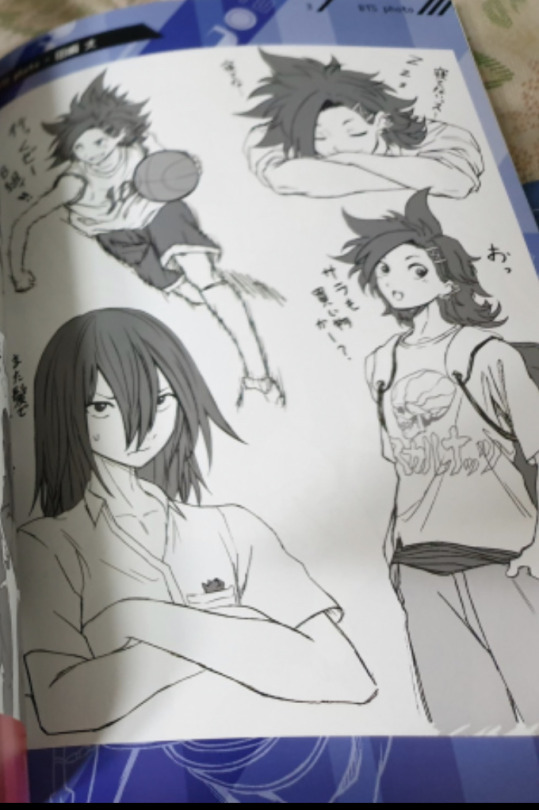
good afternoon 2 joe tazuna my fucking Boy
166 notes
·
View notes
Text
How YTTD Challenges Conventional Norms of Emotional Strength
Hello! I’ve been thinking a lot recently about how emotional vulnerability is present throughout YTTD’s characters, particularly how Nankidai contrasts more feminine coping mechanisms with more traditionally masculine coping mechanisms. I’ve touched on this topic before (albeit less directly) when I’ve discussed why I think Nao and Kanna are criminally underrated by the fandom, but I’ve never really talked about it in detail. However, when I was talking about the misogyny in Danganronpa last night, there was always a thought in the back of my mind that YTTD was different, fundamentally better in its portrayal of female characters and femininity as a whole. And as I thought about it more, I realized that the reason I think this way is because of how well it portrays and handles emotional vulnerability of its characters.
I think, first, that it’s most important to establish how emotional vulnerability in the context of gender is most commonly portrayed. Men are typically not allowed to show emotion or to cry, and their strength is determined by their lack of emotion. Conversely, the perception that women are the weaker gender is often characterized by their increased freedom to show emotion, and any “strong female character” is simply an excessively masculine woman who’s cruel and emotionless. In fact, the version of Reko we see as a doll, the Reko before Alice’s death, is actually a perfect example of the common “strong female character.” She barely cares about her brother, she’s rude, she exhibits little to no compassion, and she lashes out at the people around her. But this is not the Reko we know and love, and in fact it is the Reko whose cruelty is exhibited by her willingness to kill a version of herself. She isn’t introduced as a good character, she’s introduced as the person Reko no longer is, the person Reko has grown past, and that is a good thing.
I also find it very interesting that the two men who are physically the strongest (Keiji and Q-taro) and who assert themselves as the most masculine leaders from the beginning actually turn out to be some of the most weak and cowardly characters in the game. Q-taro has a lot of confidence in himself and his abilities; in Russian Roulette he is proud and boastful, claiming that he is strong and experienced enough to shoot the gun. However, in the first Main Game he is scared enough of dying that he nominates the children to be killed off so he doesn’t die, he has an ending where his cowardice gets the best of him and he sacrifices everyone else in order to escape, and in one of the endings to the arbitration room attraction he is too scared to push the button. His character arc doesn’t come about because he becomes stronger or more resilient, it comes about because he realizes that his life is not the only valuable one and that compassion to the rest of the group is crucial. Keiji, too, suffers from incredible emotional weakness. Though he is incredibly muscular and centers himself as one of the group’s leaders immediately, one of his biggest flaws is his inability to deal with his own emotions. Though he’s aware of how atrocious his actions have been, he’s far more willing to hide from his problems, avoid confrontation, and take advantage of his selfishness than he is to actually make steps towards change. And this undoubtedly a flaw of his!
Then, on the other hand, you take the third “buff” character, but the one who doesn’t immediately aim to set himself up as a strong leader. While Keiji’s first goal is to take charge of the group and Q-taro’s first goal is to establish himself as the strong one, Alice is immediately set up as a coward. Sure, when we first meet him in the locker he’s sort of intimidating, but as soon as we interview him we realize that he’s sort of an idiot and doesn’t pose much of a threat. The interesting thing, though, is that Alice is really the most emotionally mature out of all of the buff men in the game. Like Keiji, he has committed a terrible crime and has come to terms with the consequences for what he’s done, but unlike Keiji, he’s willing to take actions and make reparations. He lets himself be a more compassionate person, becoming a protector over Kanna of sorts, and he never prioritizes his own well-being over that of the people he cares for. He is a fully-fledged, unapologetically emotional character who doesn’t try to bury his problems in the hopes that they won’t come back to haunt him. Out of all of the “strong” male characters, his approach to his issues is a rather feminine one, but it ends up being the one that cements him as a better person than the others.
Now, I set this up while talking about Keiji’s lack of emotional vulnerability, but I believe that one of the biggest components playing into it is how trust is such a huge factor in the game. And this begins to involve Shin, too. It becomes clear throughout the course of the game that one of the only reasons Sara has made it this far is because she harbors the ability to put her trust in others and because they put their trust in her. We see, then, that Shin becomes an enemy to the group because he refuses to trust any of them and mocks all of them for being so willing to trust the others. Our biggest point of contention with Keiji, as well, is when he refuses to share his Me-Tokens with us out of fear that we could learn something about his backstory. Both men have terrible experiences with vulnerability, and they loathe the prospect of putting their trust into anyone else for fear of what could happen with it. However… the game sets this up as a very bad thing. Lack of vulnerability turns Shin into a villain, and the only way that he manages to redeem himself is by utilizing his compassion for Kanna and sacrificing himself. Keiji, similarly, loses his credibility as a person because he refuses to be vulnerable, and his distrust of himself and avoidance of his problems are what make Midori’s attacks hit so hard in 3-1A. Our villain characters exist because they cannot trust anyone, because they cannot be vulnerable, and in the same way we see Sara turning into a villain as she loses her trust in the rest of the group.
To tie this all together, I think that this is why Nao and Kanna are undoubtedly the strongest characters in the game- because they are female characters who are allowed to show emotion, because they are allowed to show their trauma, and they’re allowed to grow past that. When we’re introduced to Nao, she’s already someone who appears very weak in a feminine sense, panicking and freaking out in response to the situation. Kanna is the same; her sister is dead, and this has left her as a weeping, emotional mess. Nao’s condition only gets worse as the game goes on; she loses the mentor who’s most important to her, and in a blind panic she ends up causing a lot of harm and concern to her fellow participants. In any other game, this would probably have been where the characters of these two would have stopped, or even how they would have ended. They’re women, they’re not supposed to be strong, they already have weak and emotional coping mechanisms for their problems. However, Nankidai lets the two of them grow past this point while still letting them retain their more emotional components. Nao lets herself retain her memory and affection for Mishima, but she makes the conscious decision to abandon the AI and work with Shin to combat the evil one. Kanna retains her friendship with Shin, but she does so carefully, displaying enough kindness to him to make him change his heart. Even when she tearfully pleads for Sara to let her die, it comes from a point of what she considers emotional wisdom and her own evaluation of her usefulness to the group. If she’s left alive, her character comes full-circle and she realizes that she does, in fact, have value to the group, which gives her the will to live on. Both of these women have well-developed character arcs that allow them to feel vulnerability and emotion. They become stronger and wiser people without fundamentally changing who they are, and their femininity doesn’t have to be compromised or belittled for them to become better people. Though they are physically the weakest characters and have some of the biggest low points of the game, they are in fact well-developed and emotionally mature. Their vulnerability is what gives them this opportunity, and it truly wraps together how well Nankidai portrays femininity and vulnerability in his story.
#here i am#writing a gay little meta#enjoy#i thought about this to some degree#yttd#your turn to die#yttd meta#nao egokoro#kanna kizuchi#keiji shinogi#kimi ga shine#depressobean rambles
263 notes
·
View notes
Link
i was bored so i made a yttd character uquiz!!! if you take it, please reblog with the answers, i’m really curious to see what you guys get
#i took the quiz and got sara#which means it's accurate i guess lmao#yttd#your turn to die#kimi ga shine#depressobean rambles
201 notes
·
View notes
Text

wake up babes new beeduo name
68 notes
·
View notes
